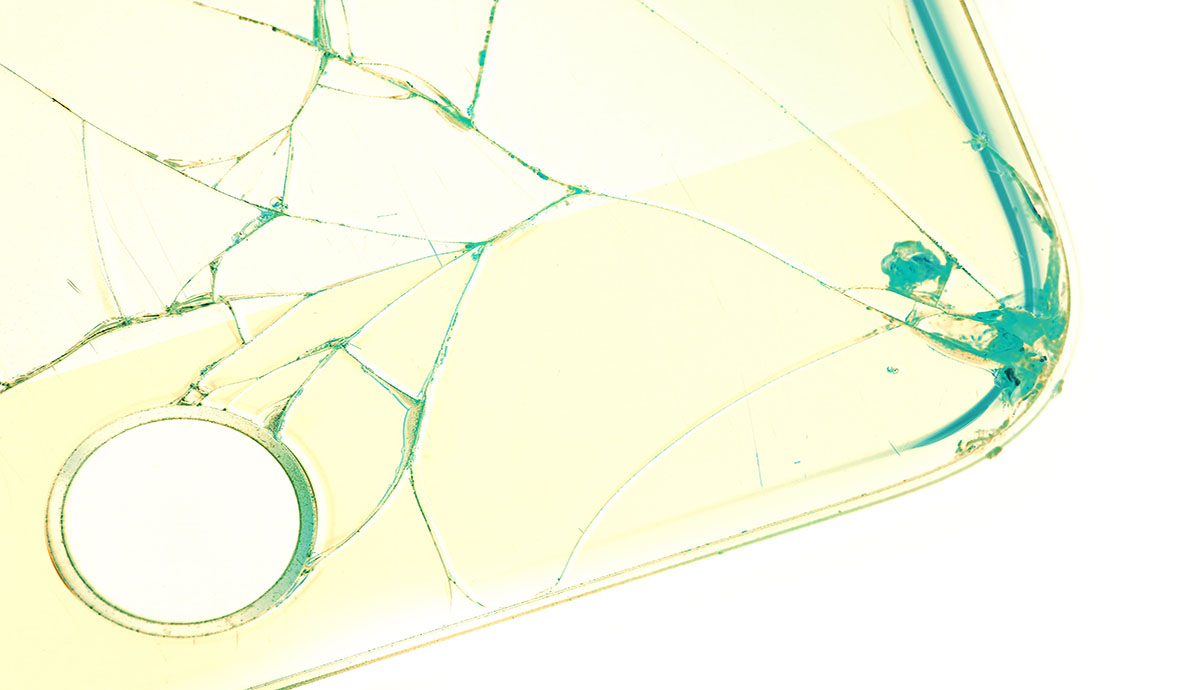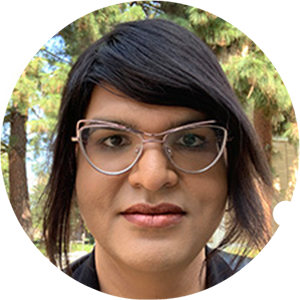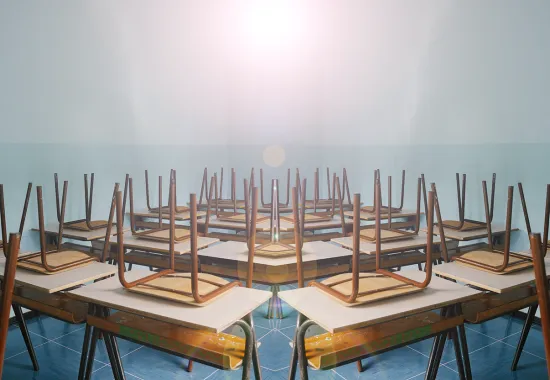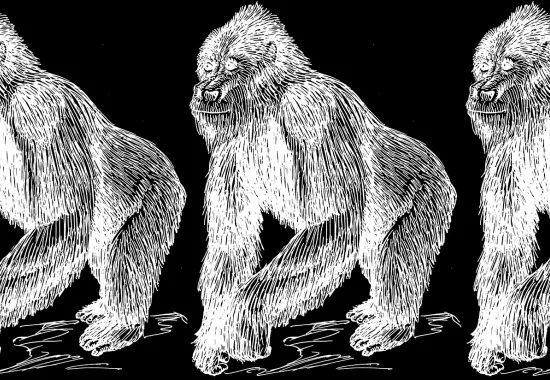There is no real world for our kids to experience
My toddler twists her wrist and reaches out, palm upward, like a schoolteacher asking for contraband. When I give my phone to her, she’s not satisfied—she stands at my feet, pawing at my pocket, until I give her the headphones as well. She’s eighteen months old, hasn't had her first word, but she toddles around our living room, holding the phone to her head and babbling nonsense.
She can't actually ‘use’ the phone yet, in the sense of interacting with it to play with apps or watch content. Supposedly we won't be the sort of parents to placate their child with screen time. That’s the trend in Silicon Valley, where we live. When I give her the phone, I tell my wife, “It just keeps me from looking at it myself.”
Sitting at the foot of the couch, my daughter fumbles open the headphone case and plucks out the earbuds, then swivels and manipulates them, puts them back in, and, beaming, she thrusts the case back at me. When I take it, she beats her hands together. You should clap! I've done something worthy of clapping.
Ten minutes later, I’m tired of her screams. It’s eight a.m.—our nanny doesn't come until nine. My wife has begged to go back to bed, she’s pulled an all-nighter writing a grant. Which is to say, she’s stared into her computer for a full night.
⚈
I yearn to go upstairs and let my screens spin stories for me: I want to text a writer friend, I’m full of gossip about another friend who’s gotten into a Twitter controversy; I want to text someone else about how happy and exuberant I’ve been feeling lately (courtesy of gender affirming hormones that are slowly feminizing me); and maybe I’ll listen as well to the audiobook I’m halfway through—the Hebrew Bible, narrated by the same voice actor who narrated the six volumes of Knausgaard (Edoardo Ballerini, he of the very sensitive and wise, though gruff, voice). At my computer, I’d also write in my to-do lists, book appointments, work on my novel in a special word processing software just for novels, and browse through books and comics and poetry.
My father-in-law is staying in the basement, but when he's not around I have a virtual reality headset that lets me combine walking around and beating up zombies or dancing to rhythm games. The graphics don’t look realistic, but there is an impossible sense of reality: the objects feel like they're really there (at least until you try to touch them).
For weeks I’ve been saying this is happening, virtual reality is here, in ten years we’re going to be spending all our time inside these headsets.
And why not? People think of virtual reality as replacing the real world, but that’s not true—what it replaces is the two-dimensional virtual world where we already live most of our lives. If I’m already spending six hours a day with my mind in a virtual space, then why should that space be constrained to a thirteen inch screen? Why shouldn't it be all around me?
⚈
But right now I can’t do any of those things. My baby can’t talk—I can’t communicate with her. But she is trying to communicate with me, opening her mouth, showing me her ten teeth and the dark ululating mass at the base of her throat. I go through the ritual of offering her different foods and toys. It’s tedious—nothing compared to the infinite reality of online life. When she was younger, I used to listen to audiobooks through headphones while caring for her, but now she’s late in talking, and I’ve been wondering if my not being present for her is the culprit.
Finally I announce I’m taking her out. She loves going for walks. I only have to say the word ’walk’ and she hops up, her face clearing, she scampers down the hallway, grabs her shoes, starts jamming her feet into them, and while I fill her bottle, she goes to the door, reaching for the knob. When I open it, she starts trying to pull open the collapsed stroller outside.
We live in San Francisco, and the morning is chill and overcast, but not foggy. The moment I have her in the stroller, she’s quiet—I turn on my audiobook and start down the street. The hill is steep, and I'm only holding onto the stroller, letting gravity take it—my role is ensuring it doesn't get away, like our avocados sometimes do when we’re taking in the groceries, and end up in the pile of guacamole we joke is at the base of the hill.
⚈
My reaction to becoming a parent was more muted, I think, than that of many women, even other women who weren't birth parents. I am fond of our baby. I am glad we have her. She's never driven me too far into the depths of frustration or despair. She’s a good baby, eminently manageable—she started sleeping the whole night, from seven p.m. to seven a.m., after a brief period of sleep training. So for half the day, I don't have a baby at all.
I love holding her, cuddling her, running my fingers through her hair, pinching her soft skin—having a baby feels almost obscene—you're allowed to be so utterly free with their bodies—you pick them up, hold them, kiss them—they're like living stuffed animals.
But I still don’t understand why people have children. What meaning am I supposed to be getting from this experience? My wife says, “It’s about taking care of someone and caring for someone besides yourself.” And I always say, “But we made her. We chose to make her. We paid thirty thousand dollars (we did IVF) to make her.” She didn’t exist to take care of until we chose to create her.
⚈
In contrast, during the first year of the pandemic, my mother-in-law lived with us. She has dementia, and she would often emerge in the morning, wild-haired, holding scraps of paper, speaking gnomically, “I just need—I need the—the phone number!”
I found tremendous meaning in taking care of her. For the first time, I understood why women might prefer to be carers for family, especially if the alternative is paid employment in a dull or demeaning job. My mother-in-law might have died if she wasn’t with us. It took her months to understand the seriousness of Covid, and during those months, if she’d still lived in her condo in Santa Cruz, she would’ve walked around maskless and unaware.
She had other family she could’ve lived with, perhaps, but they were far away, and she probably wouldn't have chosen to be with them. She absolutely needed us.
And I got pretty good at managing her moods. I understood how her mind worked—the way it responded more to emotion than to reason—I learned to notice the instances when her emotions were piqued—and something about the twists and turns of her mind as it worried over her usual preoccupations—usually involving her finances—allowed me to parse her sentences even when my wife, her daughter, couldn’t. And that was meaningful to me in a way having a child somehow isn’t.
⚈
When we get to the park, an assortment of purebred dogs are running around, chasing each other, as their owners congregate. I let my baby out of her seat, and she goes behind the stroller and grabs her bottle. I twist off the cap, and she jams the bottle in her mouth, even as she totters uncertainly over the pavement.
I’ve turned off the audiobook of the Bible that I listened to while pushing the stroller, even though it’s just getting to the good part—Jehu is about to order Jezebel thrown out the window. I sit on the curb and my daughter comes to me, and I hold her as she sucks on the bottle and stares at passersby.
And, looking at my girl, as she picks up a handful of dead leaves and holds them in the air, I don't see how it's possible for her to live a truly embodied life.
Lately I’ve been feeling a pesky sense of inner peace: when I try to recollect my usual concerns and preoccupations they seem absurd. I write young adult novels—people are always getting angry at other people, calling them racist and sexist. It’s happened to me, it happens to everyone. And it’s very upsetting, because it seems to strike at your core: your self-conception as a good and superior person. But lately I’ve been thinking, I’m not good or superior. The rating scales don’t make sense. None of that psychodrama is real.
⚈
Amongst the youth, it would be highly problematic to claim virtual life isn’t real. They would say, well, such and such people—for instance, trans people, like me—get harassed so extensively in real-life (meat-space, as some techies would call it), that they can’t feel comfortable except online. To denigrate the only place where some people can freely express themselves is a reflection of privilege.
And I don't think virtual life is bad. I quit drinking ten years ago. I quit eating sweets, have quit playing video games for long periods of time. If I thought something was bad for me, I wouldn't do it. I spend a lot of time using screens, because screens reward me for that time. Without screens, I wouldn’t have friends. I wouldn't be getting exposed to the timeless wisdom and excellent storytelling of the Hebrew Bible! I wouldn’t have met my wife! I wouldn’t know what being trans was, much less than it was the solution to so many of my existential woes.
Growing up, my family got the internet when I was about ten years old. And from that point on, I probably spent the majority of my free time in front of a computer. I hardly hung out with friends outside of school: I’d come home and be on the computer until two or three a.m., usually playing SimCity, Wing Commander, Ultima, or other games—or chatting on instant messenger and posting on message boards.
⚈
It’s very common for people my age to say, “We are the last generation of people to remember a time before the internet.” And I do remember that time! Although I was always bookish—the teachers once wrote home to my mom because they were concerned I was spending too much time hiding under the jungle gym reading Holocaust novels—I also played a lot outdoors. I was a latchkey kid. I and other neighborhood kids would be in and out of each other's houses: we made homemade bows and arrows, built forts, got super soakers and had “water wars,” rode our bicycles to a nearby cemetery hidden behind a windy path, or spent our time larking under a bridge (in the same spot where a girl in our class once spotted the dead body of a homeless man!). You know, classic analog childhood stuff.
We want our kids to do that stuff. But, sitting in this park, I wonder at what age I’ll let my girl wander around alone? I don't see many middle-class people letting their nine-year-olds play alone in San Francisco, minutes away from major highways and homeless encampments. At the playground, every kid is accompanied by their adult, who often follows them around, trailing just behind.
⚈
And if my daughter did go out, where would she go? What would she do? What alternative do we give her to virtual life?
⚈
I let go of my girl. She turns around, shoves the bottle at me, and toddles into the grass without looking back. The park is empty, and she goes quite a distance, then squats at the base of a tree, poking at the mulch, confident that she's perfectly safe.
My phone was in my lap, but she hadn’t reached for it or even looked for it—out here in the real world, the grass and the trees and the dogs and other kids—the infinite variety—can compete with the virtual world. But in our house, it can’t. We only have so many toys and games, and those toys and games are no less constructed than their virtual counterparts.
My books don’t rely upon the real world. I’m a social novelist. My books are about hierarchies and power struggles—relationships between people. And those are timeless, whether they happen online or in person. But I’ve lived too long inside a screen: I’ve gotten into poetry lately—an immense amount of which seems to be about fields and flowers—and that stuff means nothing to me. The juice of life doesn't happen, for me, in the outside world.
And, looking at my girl, as she picks up a handful of dead leaves and holds them in the air, I don't see how it's possible for her to live a truly embodied life.
⚈
I think of the philosopher I once heard about who didn't believe in God himself, but who thought all kids needed to be inculcated with religion and God so that, even if they eventually grew out of a belief in the divine, they’d already be habitually moral.
⚈
But, then I think of my parents, who were overweight themselves—like most immigrants they’d started ballooning the moment they came to this country—and who stocked our refrigerator with cookies and chips and soda, but who would shame me constantly for being fat. They knew how hard it was to be fat, and they’d experienced what it was to be thin, and they wanted me to have what they'd had. Their own shame and hopelessness was redirected at me, but because the same forces that had conquered them were being directed at me, I didn’t have a chance.
⚈
Which is a fancy way of saying the obvious: I see less value in the real world than I do in the virtual. I like online life. I prefer it to real life. Because real life is empty. I have nobody to meet in this park. Nobody to say hi to, nobody for my child to play with. I will hear no stories here, witness no miracles, and since I work from home, I have no commercial reason for being here either. Real life can offer sensation, it can offer beauty, it can offer peace, but those are fleeting things. All the things I would do on the computer: listen to stories, gossip with friends, engage in debates—they all have real-world analogues—but those analogues are impractical in the world we’ve constructed. And in their absence, the real world has beauty, but little use. It has form, but no function.
⚈
I make eye contact with a few other parents, but they look away—to them, even if I have a child, I’m a tall, bald-headed brown man. And in any case they're on their way from here to there. I’d like this experience of being out here, with my girl, for it to contain more, for it to be fuller, but I don't know how to make that happen, and it seems not just foolish, but also a little cruel, to expect my child to accomplish what I cannot.
⚈
And yet, briefly, she does. When I pick her up and put her back in the stroller, she screams and struggles. I belt her in, and she's crying and wailing as I roll her home. I stop to offer her my phone, but she pushes it away and pouts. I put on the audiobook, and dogs chew on Jezebel’s corpse as I push my baby home.
Recommended
Encounter
Schizophrenic Sedona
Recense (realized)






